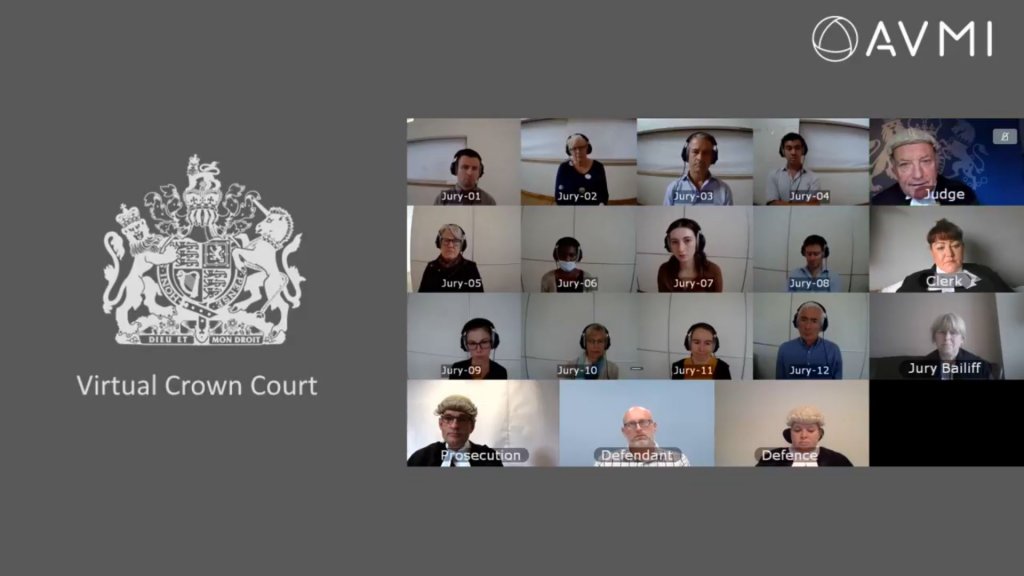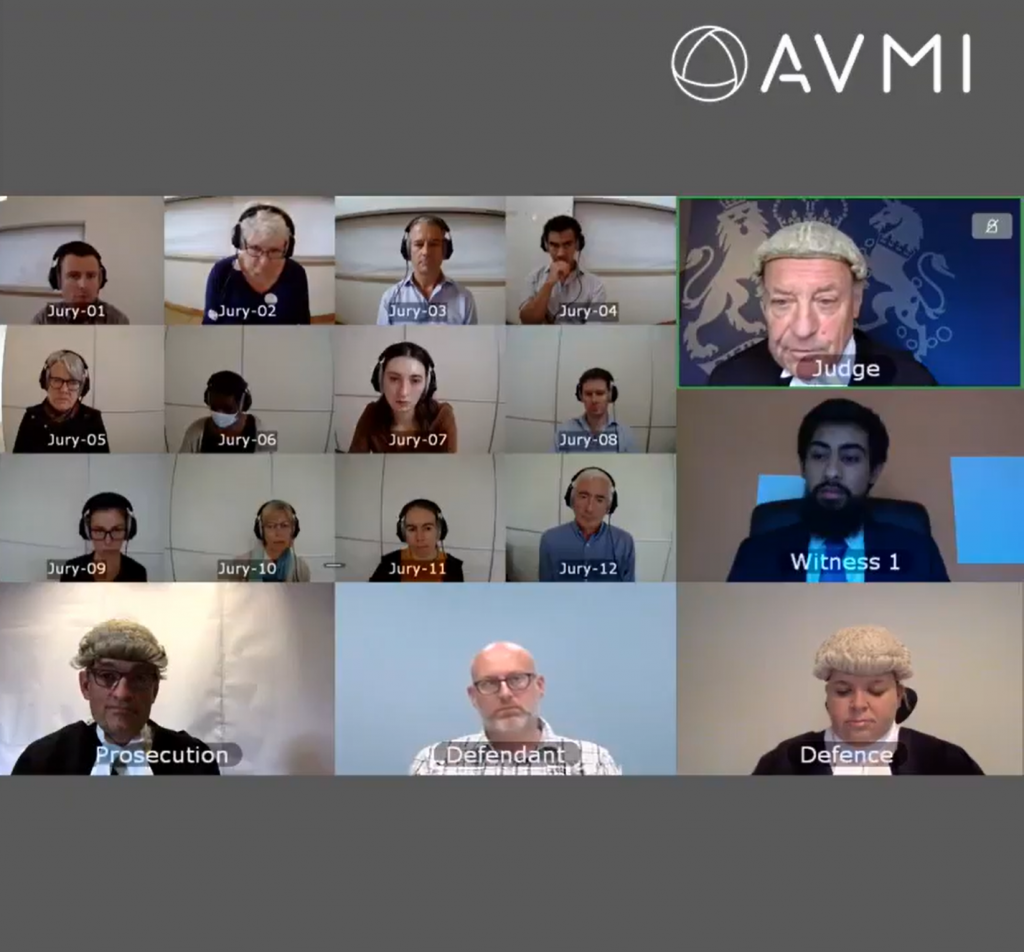JUSTICE has been engaging extensively with HMCTS over the impact of COVID-19 on the courts and tribunals. We are concerned that courts and tribunals should continue to afford access to justice as far as possible during this emergency period. We have contributed to HMCTS thinking on principles for conducting fair video hearings, assisting in the design of questions for consultation and preparing a response described as “extremely thorough and useful.” This is being fed into cross jurisdictional plans for AV research, guidance and design of the technical solution.
Ensuring fairness in socially distanced trials
On 23 March 2020, all new trials were suspended because of fears that they might contribute to the spread of COVID-19. The suspension meant that those remanded in custody faced an indefinite period deprived of their liberty without a determination of guilt. Parties and witnesses also faced increased uncertainty and a lack of closure. All the while, the existing backlog of cases continued to increase.
Some jurisdictions moved to online proceedings fairly quickly. Others slowly introduced hearings with a mixture of in-court and on-video participants. On 11 May 2020, it was announced that jury trials would resume ‘under special arrangements’. The trials, starting at the Central Criminal Court in London and Cardiff Crown Court, would use multiple courtrooms for the jury, reporters and participants in the trial. The courtrooms would be linked by closed circuit TV. These are all ways to enable socially distanced proceedings to continue.
This is an important moment to carefully consider how the changes to our courts will affect the administration of justice. JUSTICE has three key concerns about the fairness of socially distanced trials:
a. Participants in socially distanced trials are likely to be concerned about the health risks of going to court, which will inhibit their engagement;
b. Socially distanced trials raise fair trial concerns because they may involve less diverse juries, impede effective participation, have poor sightlines and create barriers to open justice; and
c. The small number of socially distanced trials which are able take place will not substantially deal with the backlog of cases in the criminal justice system, with around 350 adjourned jury trials added to that every week.
JUSTICE virtual mock trial
JUSTICE has been testing the concept of fully remote jury trials, where all participants join the virtual court via video, with the hearing livestreamed to a virtual public gallery. This uses a video platform already utilised in the courts and which can be accessed from home computers.
The virtual trial has been developed in collaboration with Corker Binning solicitors and audio-visual solutions company AVMI, with support from barristers, a retired judge and our members to play the role of jurors, witnesses and the defendant. It is also being independently evaluated by expert academics. All participants have generously volunteered their time and resources to support this project.

We have held three test trials so far, making improvements each time in response to professional, academic and lay feedback. Our fourth test took place on 12 June 2020, with jurors joining from a local hall within walking distance of their homes. You can watch the trial and introduction to the virtual court for jurors and witnesses here.
If you require information on how the Jury hub was created or to discuss the technical solution, please contact:
Jason Turner Jason.turner@avmi.com or Stuart Davidson Stuart.davidson@avmi.com.
We consider that the trials have shown promise, even providing improved sightlines in the court, which ensures that all participants can see and hear each other at all times. This brings parity and effective participation to the proceedings and suggests that many cases – civil, family or criminal – involving witness evidence could be conducted in this way. However, we recognise that some trials will not be suitable for the virtual court – such as complex, multi-party cases and where parties have vulnerabilities to which a virtual trial cannot adapt.

Participants were asked to provide feedback following each trial. Some jurors commented as follows:
Professor of law at the University of Glasgow, James Chalmers:
“Having been very sceptical of the possibility of a jury deliberating electronically, I found myself converted by the set-up trialled by JUSTICE – the software worked very effectively and enabled jurors properly to evaluate the evidence and deliberate on it.”
Patricia Hitchcock KC, Recorder of the Crown Court:
“I was impressed with how much better my view of all the participants was than it usually would be for a juror in court, and by my ability to hear everybody involved.”
Professor Richard de Friend, former Director of the College of Law said:
“The overall organisation was highly disciplined, tightly timetabled and structured – far more so than was the case when I was a juror in a real trial.”
Baroness Shami Chakrabati CBE, former Director of Liberty and Shadow Attorney General:
“I approached your experiment with some scepticism… I had a good and close view of everyone, far better than had I been in a physical court. Crucially the defendant’s “box” was not a “virtual dock” but a simple visual square like all the others. I have no doubt that this will have contributed to a greater psychological “equality of arms” between him and the key prosecution witnesses in particular.”
Exploring the case for Virtual Jury Trials during the COVID-19 crisis – an evaluation of a pilot study conducted by JUSTICE
JUSTICE commissioned experts in court design, evaluating justice spaces and experiential and procedural justice, Professor Linda Mulcahy and Dr Emma Rowden, to independently evaluate the virtual mock jury trials. The report has the following objectives:
- to evaluate how well the technology worked in the virtual trials;
- to compare the conduct of the trial with traditional face to face hearings;
- to consider whether there are any benefits to virtual trials;
- to appraise whether there were any problems that arose which might give cause for a legal challenge; and
- to evaluate what lessons might be learnt from the two virtual trials conducted to date.
The academic evaluation concludes that “It is in the view of the authors that HMCTS should seriously consider the benefits of this format for restarting criminal jury trials, in order to deal with the significant backlog facing the criminal justice system.”
Read the second evaluation here
Read the first evaluation here
Read the extracts of comments from jurors who took part in the fourth trial
JUSTICE surveyed participants after each mock trial and the academic experts have compiled the attitudes of almost 100 participants in this survey report. Levels of satisfaction across the sample in relation to a large number of measures suggests that the model developed by the fourth trial is worthy of serious consideration. With identification of appropriate jury hubs that serve local communities and are of adequate quality to perform the role as piloted here, there is scope for widespread implementation during pandemic conditions.
This project has been possible with the support of JUSTICE volunteers. If you would like to get involved in our work please join JUSTICE.
Join JUSTICE – Make a difference
JUSTICE Response to HMCTS Survey on Conducting Video Hearings (April 2020)
JUSTICE considers that any fully remote hearings taking place during the Covid-19 pandemic must be procedurally fair. We provide responses to questions posed by HMCTS below which draws on our research, including 18 responses so far to a survey of the experiences of the JUSTICE membership, across many first instance and appellate jurisdictions with remote hearings during the Covid-19 pandemic, our Working Party reports which have considered vulnerability and online justice processes, the experiences of Intermediaries for Justice, desk based research and the ongoing testing of a mock virtual jury trial simulation facilitated by JUSTICE.
Our briefings on COVID-19
23 March – JUSTICE submits a briefing on the emergency Coronavirus Bill
1 April – JUSTICE submits briefing on Coronavirus (Scotland) Bill
2 April 2020 – JUSTICE submits a briefing to the Justice Commons Select Committee
